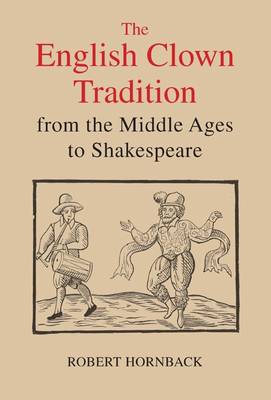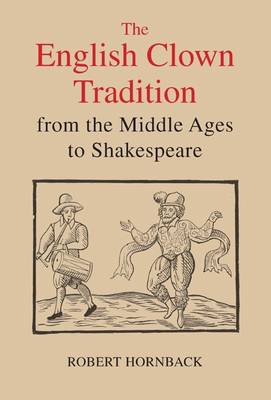
Bedankt voor het vertrouwen het afgelopen jaar! Om jou te bedanken bieden we GRATIS verzending (in België) aan op alles gedurende de hele maand januari.
- Afhalen na 1 uur in een winkel met voorraad
- In januari gratis thuislevering in België
- Ruim aanbod met 7 miljoen producten
Bedankt voor het vertrouwen het afgelopen jaar! Om jou te bedanken bieden we GRATIS verzending (in België) aan op alles gedurende de hele maand januari.
- Afhalen na 1 uur in een winkel met voorraad
- In januari gratis thuislevering in België
- Ruim aanbod met 7 miljoen producten
Zoeken
The English Clown Tradition from the Middle Ages to Shakespeare
Robert Hornback
€ 153,45
+ 306 punten
Uitvoering
Omschrijving
From the late-medieval period through to the seventeenth century, English theatrical clowns carried a weighty cultural significance, only to have it stripped from them, sometimes violently, by the close of the Renaissance when the famed `license' of fooling was effectively revoked. This groundbreaking survey of clown traditions in the period looks both at their history, and reveals their hidden cultural contexts and legacies; it has far-reaching implications not only for our general understanding of English clown types, but also their considerable role in defining social, religious and racial boundaries. It begins with an exploration of previously un-noted early representations of blackness in medieval psalters, cycle plays, and Tudor interludes, arguing that they are emblematic of folly and ignorance rather than of evil. Subsequent chapters show how protestants at Cambridge and at court, during the reigns of Henry VIII and Edward, patronised a clownish, iconoclastic Lord of Misrule; look at the Elizabethan puritan stage clown; and move on to a provocative reconsideration of the Fool in 'King Lear', drawing completely fresh conclusions. Finally, the epilogue points to the satirical clowning which took place surreptitiously in the Interregnum, and the [sometimes violent] end of `licensed' folly. Professor ROBERT HORNBACK teaches in the Departments of Literature and Theatre at Oglethorpe University.
Specificaties
Betrokkenen
- Auteur(s):
- Uitgeverij:
Inhoud
- Aantal bladzijden:
- 256
- Taal:
- Engels
- Reeks:
- Reeksnummer:
- nr. 26
Eigenschappen
- Productcode (EAN):
- 9781843842002
- Verschijningsdatum:
- 17/09/2009
- Uitvoering:
- Hardcover
- Formaat:
- Genaaid
- Afmetingen:
- 163 mm x 236 mm
- Gewicht:
- 476 g

Alleen bij Standaard Boekhandel
+ 306 punten op je klantenkaart van Standaard Boekhandel
Beoordelingen
We publiceren alleen reviews die voldoen aan de voorwaarden voor reviews. Bekijk onze voorwaarden voor reviews.









